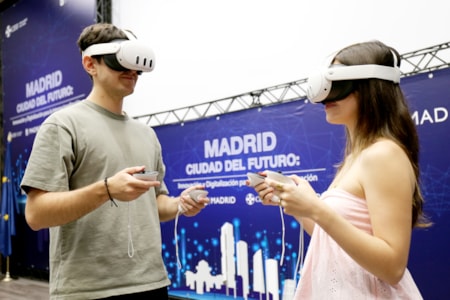
“Today, Madrid is at its best. It used to be a city of transit but now it is a city of destination” as was stated by the Director General of International Relations at the Madrid City Council, José Herrera Antonaya, during the event 'Madrid, City of the Future: Innovation and Digitalisation for Internationalisation'. Organised by the Madrid City Council along with the Vice-Rectorate of Strategic Planning and Digital Culture, headed by Emiliano Blasco, the event brought together professionals from various fields to analyse the opportunities for the internationalisation of the Spanish capital through innovation and its heritage, focusing on digitalisation.
Herrera recalled that “the fact that our city welcomes people from all over creates a diverse and multicultural climate, very attractive, which makes even those who are not from Madrid feel like Madrileños”; in this regard, he highlighted the sustained attraction of tourism: “We expect 11 million visitors this year.” This tourist attraction has a “significant impact” on the economic activity of the city, which “has increased from 18 billion euros in 2019 to 23 billion.” “Madrid receives 55% of the foreign investment that comes to Spain - a clear reflection of the climate of confidence, conducive to creating business and employment,” he pointed out.
For her part, the rector, Rosa Visiedo, emphasised the role of these events in creating links and generating spaces for dialogue on the challenges and opportunities that digitalisation offers to all Madrileños. In this vein, she described Madrid as a centre for attracting talent, tourism, and investment: “An innovative city, where projects and solutions are proposed in search of improving society and the quality of life for its citizens; a 'Smart City' that is increasingly accessible, welcoming, and friendly.”
To present the projects the City Council is working on, Celia Tenes, Technical Advisor to the Directorate General of the Digital Office, explained how the process of Digital Transformation in Madrid is progressing, “considering that Madrid is a city larger than many countries.”
The day included two round tables that analysed Madrid's role as the innovation capital of Southern Europe and the combination of internationalisation and applied intelligence in the city. Discussion addressed how applied intelligence can transform cities urbanistically, making them more sustainable and efficient, improving urban quality of life, and attracting foreign investment.
Participants included professionals such as Fernando Álvarez García, Deputy Director General of Digital Transformation at Madrid City Council, Nieves Navarro from the Polytechnic University of Madrid, Magdalena Suárez, coordinator of the working group 'AMETIC Smart Territories', Gonzalo Torres, partner at EMA Architects, María Jesús Villamediana, representative of ‘Madrid in Game’ (General Directorate of Innovation, Government Area of Economy, Innovation, and Finance at the Madrid City Council), Ángela Sánchez de la Roda, HR and Recruitment Manager at Diusframi Group, and Héctor Alcaide, Data & AI Associate Partner at IBM.
Similarly, Eloy José Urendes, Director of the Degree in Telecommunications Systems Engineering, gave a talk titled: 'Control of a Robotic System using Cloud Computing and Virtual Reality'; and to close the event, María Rodríguez Velasco, Professor of the Degree in Art History, gave a talk on the preservation of cultural heritage in the digital age, exploring how new technologies can be allied in the management and conservation of Madrid’s rich historical legacy and its international projection as a driver for attracting tourism and research.
At the end of the event, attendees also enjoyed an interactive space to experience various virtual reality applications related to tourism, heritage, and 'Smart Cities'.